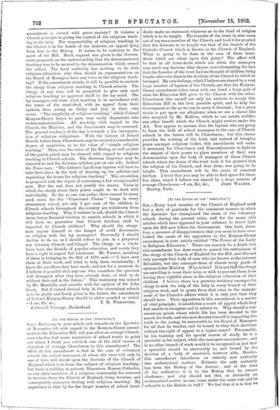(TO TUE EDITOR OP THE " SPECTATOR.")
Sia,—Referring to your article and remarks in the Spectator of November 8th with regard to the Kenyon-Slaney amend- ment to the Education Bill, will you allow an average Church- man who has had some experience of school trusts to point out where I think you overlook one of the chief causes of objection of average Churchmen to this amendment ? The effect of this amendment is that in the case of voluntary schools the school managers, of whom the vicar will only be one of four, will decide upon the doctrine of the Church of England which is to form the subject of religious teaching ; but there is nothing to prevent Dissenters, Roman Catholics, or any other members of a religious community far removed in doctrine from the Church of England, being trustees, and consequently managers dealing with religious teaching. My experience is that by far the larger number of school trust.
deeds make no statement whatever as to the kind of religion which is to be taught. The founder of the trust in nine cases out of ten was a member of the Church, and took it for granted that the doctrine to be taught was that of. the branch of the Catholic Church which is known as the Church of England. What is going to be done in the case of these trust. deeds which are silent upon this point ? The effect will be that in all trust-deeds which are silent the managers may teach any doctrine they choose, notwithstanding the fact that the founder of the trust had no thought of children being taught otherwise than in the doctrine of the Church to which he belonged. My own feelings, which I believe are shared by a very large number of laymen of the Church, are that the Kenyon- Slaney amendment takes away with one hand a large part of what the Education Bill gives to the Church with the other. Churchmen like myself are only too anxious to accept this Education Bill in the best possible spirit, and to help the Government as far as we can to carry it through ; but a great strain is put upon our allegiance when we see a clause like this accepted by Mr. Balfour, which to our minds nullifies any other benefit which the Church might receive under the Act. You appear to assume that the laymen who are going to form the bulk of school managers in the case of Church schools in the future will be Churchmen ; but this claise provides for nothing of the kind, and instead of bringing peace amongst religious bodies, this amendment will make it necessary for Churchmen and Nonconformists to fight to the utmost of their power to place members Of their own denomination upon the body of managers of those Church schools where the donor of the trust took it for granted that the religion of his Church, and that alone, was going to be taught. This amendment will be the cause of constant friction. I trust that you may be able to find space for these few ideas, which I believe are shared by a large number of






















































 Previous page
Previous page